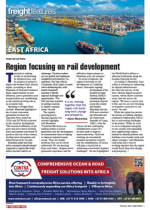East Africa’s transport infrastructure is set to become more challenging than it already is, according to multiple studies of the impact of climate change. “Eastern Africa stands out as one of the most vulnerable regions in Africa to the impacts of climate change and variability, particularly concerning hydroclimate extremes such as f loods and droughts,” write Teferi Demissie, Solomon Gebrechorkos, Maren Radeny, and Dawit Solomon in a study for the International Livestock Research Institute.Agriculture is expected to be the sector most affected, after logistics.“Climate change is not a future threat in East Africa, as it already affects the region,” they write.The consensus among researchers is that f looding poses the greatest threat to most parts of the region, although an increase in average temperatures will impact on the lifespan of tarred roads, bridges and other transport infrastructure. Rising sea levels add to the disruptions caused by f looding. A Weatheringrisk study predicts a median increase in East African sea levels from 2000 of 12 cm by 2030 and 35 cm by 2080.“ Rising sea levels threaten coastal communities and may cause saline intrusion in coastal waterways and groundwater reservoirs, rendering water unusable for domestic use and harming biodiversity,” according to the report. ER

